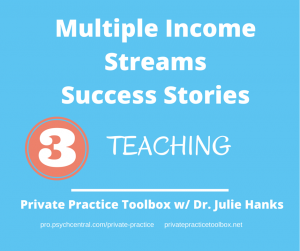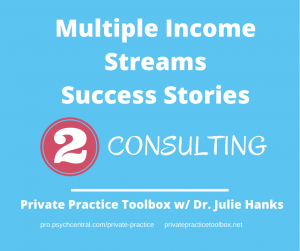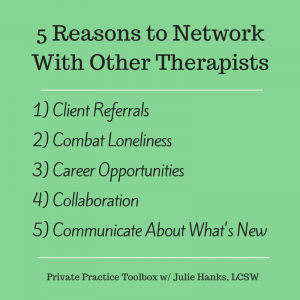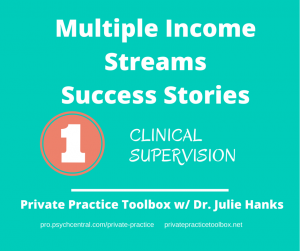 As we highlight more opportunities to use things that you enjoy doing and instances where others request your services to generate multiple income streams, I am sharing stories of other practitioners who have found ways to do just that:
We often forget that we have achieved at least a master's level education that can qualify us to teach others. There are many opportunities out there for teaching. Consider these options if teaching others is a passion for you. Teaching university or college courses, online courses or webinars, community workshops, or professional trainings.
As we highlight more opportunities to use things that you enjoy doing and instances where others request your services to generate multiple income streams, I am sharing stories of other practitioners who have found ways to do just that:
We often forget that we have achieved at least a master's level education that can qualify us to teach others. There are many opportunities out there for teaching. Consider these options if teaching others is a passion for you. Teaching university or college courses, online courses or webinars, community workshops, or professional trainings.
Getting started with teaching can be very easy; start with who you know. Contact your alma mater or other nearby colleges and universities. Many universities have positions available for adjunct faculty to teach entry level classes or to offer professional trainings to students in your field. Keep in mind, these types of teaching commitments usually last for extended periods, so be sure that they work for your timeline and make sense financially.
Presenting or developing online courses or webinars can be an easy, passive source of income. Once a training has been developed, you can easily record it and make it available for download or schedule various presentation times to virtually present it to others. This is an excellent area where your expertise can lead you to topics or needed courses. It also allows you the opportunity to reach well beyond the scope of your geographical location.
Starting small can often lead you to bigger opportunities and income growth. Consider providing small trainings at your practice for continuing education credits. Pam Dyson, MA, LPC, did just that when starting her play therapy trainings. When Pam originally started with trainings, it worked out to about 25% of her income. As those trainings became more successful Pam grew those trainings to the point where they provide 75% of her income. Pam shares this about her experience in growing teaching as an income stream.
“In 2010, I became an Approved Provider for the Association for Play Therapy. I began by offering a day long play therapy training, once a month, out of my private practice office, where attendees could earn the clock hours needed to become an RPT. I set up a website to promote the trainings, and within a year I was at capacity for each training. To meet the demand, I began offering four day-long trainings per month."
If you would like to learn more about Pam Dyson and the trainings that she offers, please visit DFW Play Therapy Training.
Community workshops are another area where teaching can be a beneficial source of income. Workshops are excellent because they often don't take much time to develop and also only last for brief periods. In my practice, we have sometimes taken areas or groups of individuals who have a need for instruction in a particular area and turned that into a workshop. I have done this when I see a consistent or similar problem in my clientele. At one point, I was working with many women who were suffering from a lack of sex drive. I developed a workshop for cultivating desire in marriage that I would present for a few hours every few months.
I encourage you to keep in mind doing those things that you are passionate about. Teaching may not be your cup of tea, but there are plenty of other ways to generate multiple streams of income. If you're still having trouble coming up with something, refer back to my 5 Key Questions to help you get started.
Visit the new PrivatePracticeToolbox.net for webinars and consulting services
Visit the new PrivatePracticeToolbox.net for webinars and consulting services
FREE Download Get 52 Blog Post Topics & prompts when you sign up for PPT list
Join my Private Practice Toolbox Facebook group and connect with 3200 therapists around the globe in 2 simple steps: 1) Click request to join the group and 2) Fill out this brief questionnaire before you’ll be added to the group.






As healers, we genuinely like to do our work. Guiding clients through the therapy process and seeing them make progress is why we do what we do. But if you're in private practice, you know there's a lot going on in the back end and that it's crucial to run an efficient and organized business.